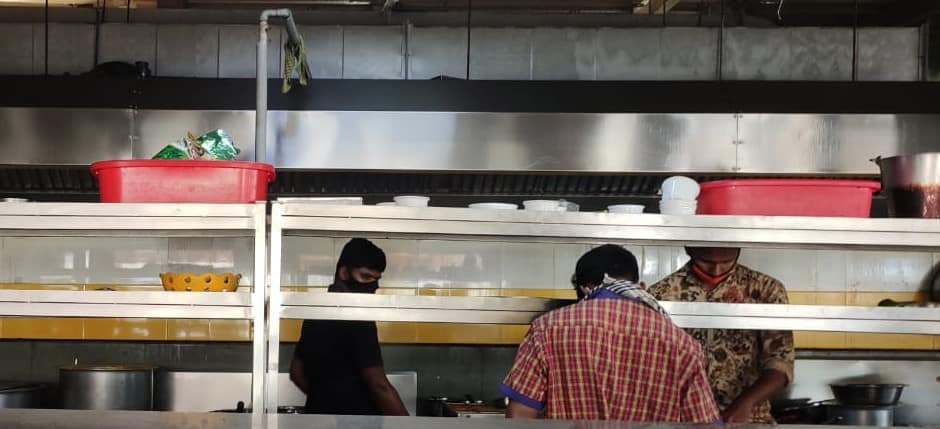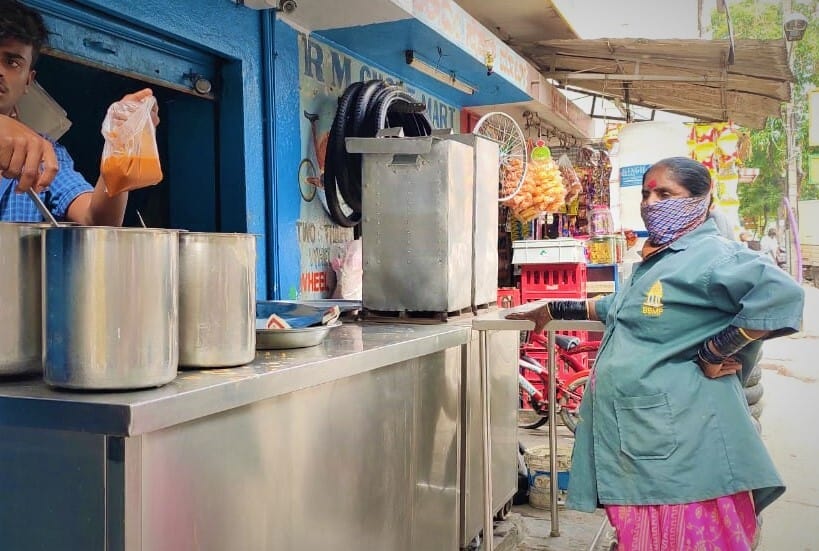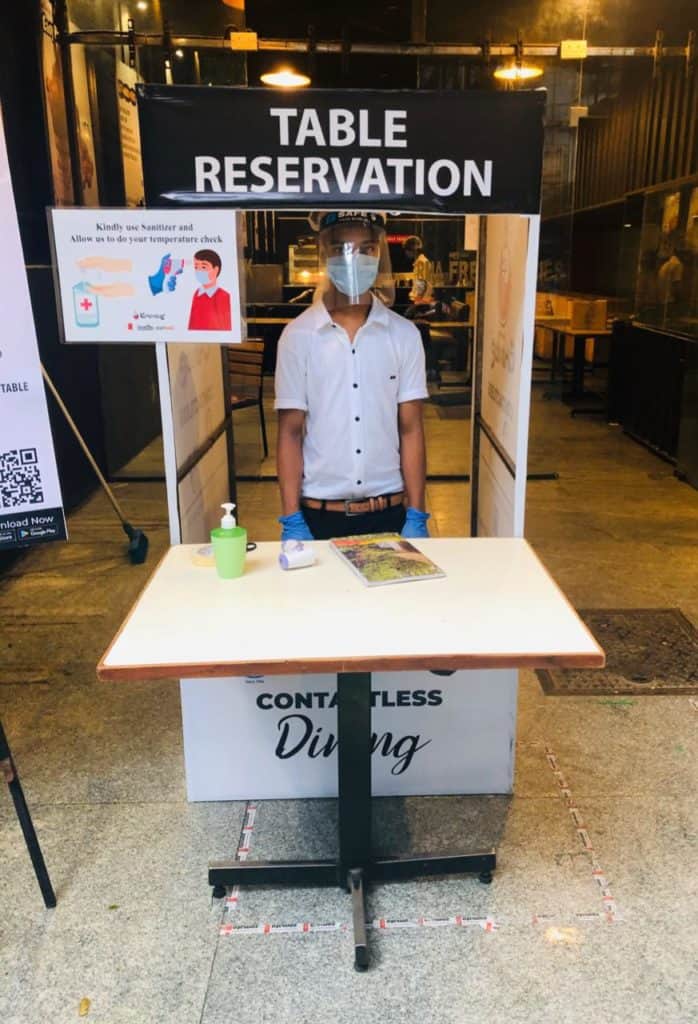As the number of COVID-19 cases are sharply rising in Bengaluru, there’s much debate on whether the city should go into another lockdown. When the city entered the first phase of unlock earlier this month, SOPs (Standard Operating Procedures) had been issued to commercial establishments and offices, on preventive measures they need to take.
Have establishments in Bengaluru been complying with these norms? Is it safe for you to visit them?
Restaurants are among the businesses most impacted by lockdown, with low footfall even weeks into the unlocking. Most restaurants have some preventive measures in place, but the extent varies.
Adapting is easier for bigger restaurants
Bigger restaurants, especially, have been able to implement safety measures with relative ease. Many seem to be following the government SOPs in terms of thermal screening of employees and customers, sanitisation, and halving seating capacity. John Bosco, Manager of Hard Rock Café, says they are following the SOPs entirely, “We only take in asymptomatic customers; we disinfect the tables every half an hour or after the guest leaves. Since we are not selling alcohol yet, we barely have customers.”
Ruby Sharma, Senior Steward at the microbrewery Toit, also says that crowds are scant, and that customers prefer takeaways to dining in. At the restaurant, “every staff member is subjected to a full-body sanitisation and temperature screening,” she says.
In contrast, smaller restaurants or darshini-style hotels face more challenges in bringing about infrastructural changes. Speaking to me while taking breakfast orders, Krishnamurthy Aital, Proprietor of Hotel Dwarka in NR Colony, says, “We are trying our best to maintain social distancing despite our small square foot area. The tables that would usually seat four persons, currently seat only two.”
Krishnamurthy says that the fear of COVID transmission has scared away his customers as well. Most of the hotel’s staff had gone to their hometowns, and the hotel management has asked them not to report to duty until the restaurant’s footfall is back to normal.
Loopholes aplenty, say customers
Ekta Sawant, who has visited a handful of fast-food and breakfast parlours in the city, pointed out that many had safety lapses. She says of one of these restaurants, “Apart from a staffer ensuring that the customers had masks on, there was no one to enforce social distancing in the queues. No one was doing thermal screening either.” As per the government SOPs, restaurants have to ensure 6 ft social distancing in queues, and can allow in patrons only after thermal screening.

Ekta recounts how she had to pick up the menu which had been used by multiple customers. “An asymptomatic COVID carrier could have touched the menu. Disposable or virtual menus could have solved this problem.” The government SOP only ‘advises’ restaurants to use disposable menus. Similarly, it only ‘encourages’ digital payments and contactless mode of ordering. Since the restaurant she visited had not facilitated online payments, Ekta had to use her card, “which again meant physical contact,” she says.
Though the government SOPs don’t mandate this, the Karnataka Pradesh Hotels and Restaurants Association has asked restaurants to maintain a record of their customers and staff, so that contact tracing would be easier if required later.
While Toit and Hard Rock do maintain a register of all their customers, Krishnamurthy said it’s harder for them at Dwarka to implement this. “There is bigger crowd at darshinis, so we are unable to keep track of those who enter.” However, the hotel does have CCTV cameras that would help identify customers if needed. Ekta says that none of the restaurants she visited were collecting details of customers.

Some restaurants, shops go the extra mile
Ashwini Narayan, who heads Internal Control and Brand development at MKP Empire ventures, says, “We have assembled a kiosk at the entrance of each restaurant, where every staff member and customer goes through sanitisation, thermal screening and registration.”
The restaurant chain has done away with menu cards. “We ask our customers to download the Empire app and scan the QR code on their tables. On the app, they can place the order as well as pay. The food will be served at a six-feet distance via trolley,” says Ashwini.
If someone is found or suspected to be COVID-positive, the entire building would be sealed off, she says, adding that the hotel has maintained diligent records of customers dating back to March 28, when they resumed takeaway services.

Madhukar M Shetty, Secretary of the Karnataka Pradesh Hotels and Restaurants Association, says they have asked restaurants to live-stream food preparation to customers as well. However, the majority of restaurants do not have the resources to implement this, barring a few like Empire.
Several retail stores too have devised creative ways to ensure safety. Gaurav Sawant, who visited a Decathlon store, says that pandals were erected outside, with socially-distanced seating for customers. “If not for the pandals, people would have had to wait in the sun, and they would’ve huddled where there was shade.” He recounts that a delivery executive accompanied him throughout, and quickly helped him find what he was looking for. He was made to scan the barcode behind the product using the Decathlon app and pay directly, eliminating the need to wait at delivery counters.
Punitha Reddy who visited Indiranagar’s Louis Philippe store was impressed with the safety measures. “We were told not to touch the clothes that were on the racks.” She was allowed to try one piece of clothing for size, which was then promptly disinfected. The staff assured her of easy exchanges in case the clothes she selected didn’t suit her.
Natasha Pillai decided to get a tattoo only after visiting Skindeep tattoo parlour in Indiranagar well in advance, to gauge the protective measures there. “The tattoo artists wore masks and gloves, and you can only go in by appointment, so they have a limited number of people at a time. The work stations would be sterilised as usual, to prevent infections.”
Safety measures have increased costs for offices
A Senior Manager (Facilities) at a reputed IT company says the infrastructural changes implemented in their campuses have pushed up their monthly pan-India operations budget by Rs 2.5-3 crore. “This consists of recurring and one-time costs. The former refers to sanitisers, handwash, paramedics on campus etc., while the latter include automatic sanitiser dispensers, infrared-thermometers,” she says, on condition of anonymity.
The company’s offices have sanitising kiosks at the reception, floor markings to depict social distancing, and lifts which only five can use. “We have also plastered caution tape on alternative urinals and washroom cubicles,” she says. Employees entering the office premises are required to disclose their travel history, and confirm they haven’t been in contact with an infected person. “Giving false information in this regard makes the employee liable for termination,” she says.
Though they have considerably reduced their workplace occupancy to comply with the SOPs, this hasn’t reduced costs since facilities like power and air conditioning would still have to be provided for the entire office. The company had recently shifted to a new commercial space and can’t opt out of the five-year lease now. If restrictions continue, they may have to look for smaller office spaces with lesser rentals, she says.
“Adaptation is the only way forward“
Dr Prashanth N Srinivas, Assistant Director (Research) at the Institute of Public Health, says that the risk from COVID-19 would remain, and that the economy can’t be stagnant for long. “It is about employing the most minimal restrictions to effectively curb virus transmission,” he says, adding that decentralised lockdowns can be implemented locally, depending on the risk of COVID spread.
He concludes, “We have to start adapting. This can be achieved through regular fumigation, and citizens internalising adherence to norms. Effectiveness of government guidelines also rests on self-regulation on the citizens’ part.”
Many of the restaurants in city doesn’t follow social distancing. Some employees wear mask in the chin for the name sake where they are supposed to cover the nose and mouth. The delivery boys from Zomato or swiggy or whatever who stands outside never follow social distancing and few of them also never covered mouth and nose with mask .it’s my observation and it’s the reality
At HSR layout and Kudlu, no one filtering social distance and above that shops are kept open after 9 pm also.
When I visited Family Market in Kempapura two days back, my temperature was 80 Deg. F.
After a few minutes I went to Iyyanar vegetable shop. My temperature was 85 D. F.
Yesterday I visited More, Sahakarnagar. My temperature was 80 Deg. F. My wife’s 85 D F.
At my age, my normal Temperature should be 98.6 Deg. F.
I called the management guys of More and asked them for an explanation. I was told that if anyone’s temperature is above 99 D. F., then they should not be allowed inside ! That was the instruction all these shop owners have received from BBMP !!! So even if the thermometer shows my temp. as 50 Deg. C. they will allow me inside !!!
My normal temp. is 98.6 Deg.
Thermometer shows 85 Deg. i.e. 13.6 D. F. less than what it should show.
Now if a person with fever, say having a temperature of 102 D. F. comes to More, their thermometer will show it as 102 – 13.6 = 88.4 D. F.
So the super market will allow this person inside!!!
What is the sanctity of such checking? This kind of ignorance along with carelessness may make Covid 19 a permanent problem.
Most of these digital temp. Guns show very low temperatures than normal making them useless. It seems BBMP has neithervtrained these people nor made them aware of temperature regime of normal people. First of all, wherefrom all these thermometers appeared? Who made them?
This is utter irresponsible attitude. Will someone notice and do something?